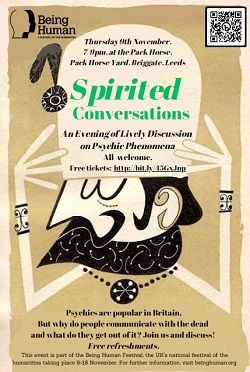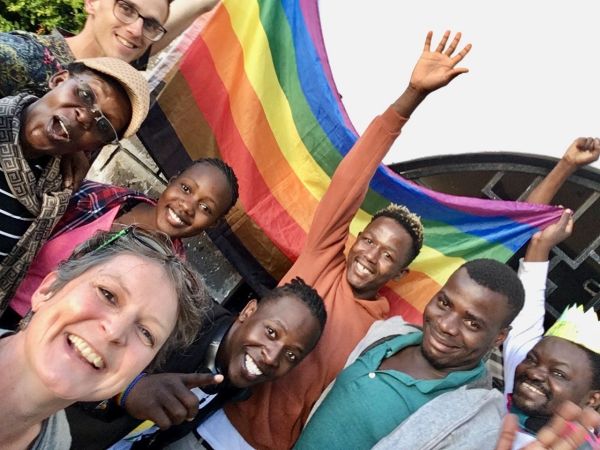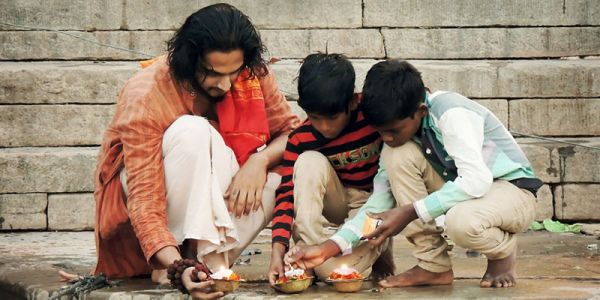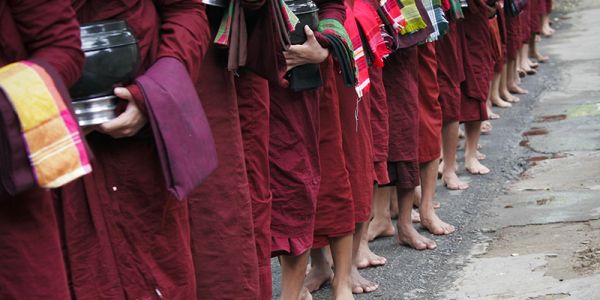Centre for Religion and Public Life
The Centre for Religion and Public Life
A hub of research, impact and public engagement activities at the intersections of religion and public life in local, national and global contexts.

The Centre for Religion and Public Life (CRPL) studies the complex and critical role of religious belief and practice in contemporary society, locally, nationally and globally. It brings together academic staff and research students in the School of Philosophy, Religion and History of Science, as well as from other Schools at the University of Leeds.
Members of the Centre employ various methodological perspectives – such as sociology and anthropology of religion, theology, biblical, religious and cultural studies – as the Centre foregrounds interdisciplinarity as critical to the study of religion and public life.
The Director of the Centre is Professor Johanna Stiebert.
Our research
Research in the Centre is concerned with contemporary religion in relation to a wide range of current issues, such as gender and sexuality, race and ethnicity, diaspora and globalisation, media, and development. The geographical contexts range from the city of Leeds, the UK and Europe, Africa and Asia. We have expertise in diverse religious traditions, such as Buddhism, Christianity, Hinduism, Islam, Judaism, Sikhism, and new religious movements.
Visit our Religion and Public Life blog and read our newsletters there to find out more about our events and activities, and work in and around the Centre.
Our people
View our members
- Mikel Burley, Associate Professor of Religion and Philosophy
- Caroline Fielder, Associate Professor in Chinese Studies
- Alistair McFadyen, Retired Senior Lecturer in Systematic Theology
- Seán McLoughlin, Professor of the Anthropology of Islam (Muslim Diasporas)
- Tasia Scrutton, Associate Professor in Philosophy and Religion
- Mustapha Sheikh, Professor in Islamic Studies; Co-Director of the Iqbal Centre for the Study of Contemporary Islam
- Jasjit Singh, Professor of Religion and Global Engagement
- Stefan Skrimshire, Associate Professor in Theology and Religious Studies
- Caroline Starkey, Associate Professor of Religion and Society
- Johanna Stiebert, Professor of Hebrew Bible
- Aled Thomas, Lecturer in Religious Studies
- Emma Tomalin, Professor of Religion and Public Life
- Adriaan van Klinken, Professor of Religion and African Studies
- Robert Vanderbeck, Professor of Human Geography and Head of School
Research clusters
Work in the Centre is clustered in the following research areas
Religion, Activism and Social Justice
Work in this area is multidisciplinary, making use of anthropological, sociological, philosophical and theological approaches and concerns a wide range of global contexts
More on Religion, Activism and Social JusticeReligion, Ethnicity and Diaspora
This ethnographic research focuses on both local, national and international levels, and is mostly concerned with South Asian Muslim and Sikh communities and traditions.
More on Religion, Ethnicity and DiasporaReligion, Ethics and Practice
Research covers philosophical, theological, ethnographic approaches, and the relation between beliefs in an afterlife and ethical or political engagement; religion, animal ethics and environmentalism.
More on Religion, Ethics and PracticeReligion, Gender and Sexuality
Research in this area makes use of anthropological, sociological, geographical, theological and textual approaches, building on feminist, queer, and postcolonial perspectives.
More on Religion, Gender and SexualityReligion, Health and Wellbeing
Work is empirical, examining the role of religious communities in public health, and also theological and philosophical, how religion contributes to human flourishing and spiritual well-being.
More on Religion, Health and WellbeingReligion, Media and Material Culture
The work explores South Asian traditions and communities in Britain and makes use of ethnographic, sociological and media-studies approaches.
More on Religion, Media and Material CultureReligion, Politics and the State
This work is multiscalar, ranging from neighbourhoods, local and national governments, state institutions such as the police, and international bodies.
More on Religion, Politics and the StateImpact and engagement
Impact activity is central to the work of the Centre. Our research strengths in the study of contemporary religion in local and global contexts require us to understand impact and public engagement in various forms as an integral part of our research – for example, in our work with local religious communities within the Community Religions Project, now spanning more than 50 years. This is the case for research in theology and biblical studies as well as religious studies. Discover more about our impact.
Seminar series
The Centre for Religion and Public Life (CRPL) is thrilled to announce its seminar series for 2025-26!
Seminars are in-person only and take place at 11.30-13.00 in Botany House 1.03, on alternate Thursdays during teaching weeks.
We are delighted to confirm the schedule for semester two CRPL seminars. Please stay tuned for more event announcements.
19 February 2026: Reconstructing Cheraman: Communal Harmony as Politics of Belonging in Contemporary Kerala, South India – Dr Dayal Paleri
Please note: this seminar will take place in Baines Wing SR (2.15), 14:00-15:30.
This talk will explore how the Muslims of Kodungallur, a historically significant town in Kerala, South India, engage in a renewed articulation of religious coexistence, primarily through the language of communal harmony (mathasouhardam, a term broadly referring to inter-religious coexistence and peaceful social relations). They do so faced with the rise of Hindu nationalist politics that increasingly problematize Muslim belonging in shared sacred and public spaces. The articulation of communal harmony by the Muslims of Kodungallur is centered around the physical and discursive space of the Cheraman Juma Masjid, believed to be the first mosque in India, named after the legendary king Cheraman Perumal, and associated with the accounts of the origin of Islam in India. Based on ongoing ethnographic fieldwork conducted in Kodungallur since 2021, the paper closely follows the process of the Cheraman mosque’s reconstruction and situates it within both the local political dynamics of Kodungallur and the broader context of national politics in India.
Moving away from scholarship that has largely highlighted the instrumentalist nature of communal harmony as a discourse produced by dominant or state actors, the paper shifts the focus to minority articulations. It asks two interrelated questions: Can communal harmony be conceptualized as an active political process that involves actors, agential networks, and conscious articulations of a political community? And what political work does such a discourse perform when articulated by Muslim actors in the context of Hindu nationalism?
The talk will argue that communal harmony is mobilized in Kodungallur as a strategic response to the contemporary challenge of Hindu nationalism and is used to affirm Muslim belonging across three interconnected sites: everyday life, historical memory, and the legal–constitutional realm. These are not peripheral but constitutive dimensions of national membership. The talk conceptualizes this articulation as a politics of belonging that combines aspects of different trajectories of Muslim politics in postcolonial India-minority rights, claims of social backwardness, civic participation, and a redefined language of self-protection-without reifying or effacing Muslim religious identity. The talk suggests that such articulations of communal harmony offer an incipient possibility for reimagining Muslim citizenship in India today, especially in the face of an increasingly constricted experience of citizenship under Hindutva politics.
26 February 2026: Habituating Purity: Negotiating Sexual Ethics, Gender, and Christian Identity in Evangelical Purity Culture in Britain – Dr Chrissie Thwaites
This talk presents findings from my doctoral research on evangelical Christian purity culture and its impact on young women in Great Britain. While purity culture has been studied in the United States, much less attention has been paid to its presence and influence in British contexts. Drawing on survey data and qualitative interviews, I argue that purity culture has been present in Britain in a less overt form, characterised by a strong emphasis on sexual abstinence until marriage as a marker of Christian identity and faithful Christian living.
Using Pierre Bourdieu’s concept of habitus, in this talk I introduce the concept of the habitus of purity culture to explain why a more implicit, British iteration of purity culture is still impactful: because the values and expectations of purity culture are gradually incorporated into the body as long-lasting dispositions, known as habitus. Community and relationships are centrally important in this habitus, but ‘sexual sin’ risks damaging them. The impacts of purity culture can thus be profound - even outside of America - as living with this habitus means living with the tension of both valorised and jeopardised relationships.
12 March 2026: Lineage, heritage and brand: untangling the genealogies of modern yoga – Dr Theo Wildcroft
Research into the development of modern yoga has involved a number of speculative typologies and genealogies for the practice. Nonetheless, the institutional evolution of modern yoga has rarely been the subject of research, and the relationship between the content of yoga practice and the container of yoga institutions continues to be a subject more of speculation than research.
To begin that task, this talk will describe research into the pedagogy of modern yoga so far, together with insights from my own ongoing research and professional practice. From local networks of religious initiation, to systems of therapeutic intervention; and from folk remedies to gymnastics training, the pedagogical roots of modern yoga are revealed as a vital missing piece in understanding the future, as well as the history of yoga.
But the working patterns of modern yoga teachers are far from unique, and closely resemble those of many other communities of practice. What this research describes is a case study into the ways that human beings evolve cultures of practice outside of formal hierarchies and state provision.
Along the way, we will define three terms that often lack precision when used in both the academic and popular discourses of modern yoga: lineage, heritage and brand. What do we mean when we accuse modern yoga as being either ‘traditional’ or ‘commercial’? Who is it that actually profits in the ‘billion-dollar’ industry of modern yoga? And to compliment the excellent work done so far to understand the roots of modern yoga practice, what might be gained by submitting the roots of modern yoga pedagogy to similar scrutiny?
26 March 2026: Hunting for the Devil: online conspiracy theories and the return of Satanic moral panic – Dr Bethan Oake
The Satanic cult conspiracy theory (otherwise known as ‘the Satanic myth’ or ‘the Satanic legend’) alleges that secret, evil, Satanic cults exist who seek to morally subvert and control society – often through targeting and harming children. The origins of the legend are traceable to the early Middle Ages, where it has since periodically resurfaced in the form of ‘Satanism Scares’: moral panics concerned with the alleged threat of Satan-worship. The concerns of these moral panics are disproportionate to any reality, and instead they act a mirror to the wider fears and prejudices of their societies. Through these events, false allegations of ‘Satanic’ crimes lead to the unjust demonisation and persecution of innocent individuals and communities. Today, there has been increasing speculation that we may now already be experiencing the next wave of Satanic moral panic. This seminar will address this question – first exploring the history of these scares, before discussing the contemporary revival of this rhetoric from over the last decade. It will draw on a variety of case studies, alongside a detailed analysis of contemporary social media conspiracy theory rhetoric, demonstrating its ongoing, and potentially very harmful, impact in recent years.
30 April 2026: Dr Stephen E. Gregg.
More details to follow.
A record of past seminars hosted by the Centre for Religion and Public Life is available here.
For further information, please contact Aled Thomas (Interim Director of CRPL): a.j.l.thomas@leeds.ac.uk.

Non-profit alternatives and more transparency in algorithm design could help to fix dating apps, Faculty researchers argue
Exploring the promises and pitfalls of online dating
More on Non-profit alternatives and more transparency in algorithm design could help to fix dating apps, Faculty researchers argue
Islamophobia Awareness Month
On the occasion of Islamophobia Awareness Month, CRPL is pleased to promote…
More on Islamophobia Awareness Month
New book on ‘cult’ rhetoric in the 21st century
The Centre for Religion and Public Life is pleased to announce the…
More on New book on ‘cult’ rhetoric in the 21st century
'Stories of Change: Religious Leaders and LGBTIQ Inclusion in East Africa' available now through Open Access
The Centre for Religion and Public Life is pleased to announce the…
More on 'Stories of Change: Religious Leaders and LGBTIQ Inclusion in East Africa' available now through Open Access









